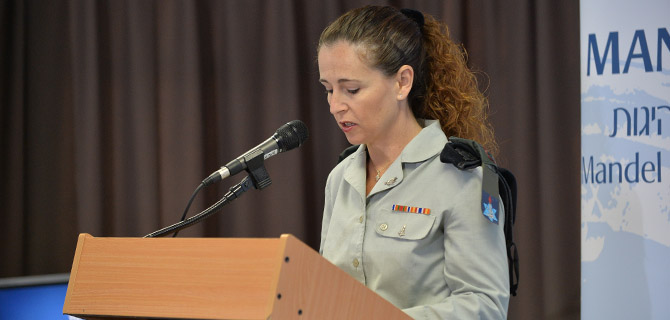What makes a commander? What do uniforms mean? Which personal values should IDF officers and other leaders model? The Mandel Platform event "Uniform Values," explored these questions. The event took place on June 6, 2016 at the Mandel Leadership Institute, led by fellows in the Mandel IDF Educational Leadership Program.
In their opening remarks, Dr. Eli Gottlieb, Colonel Yael Hess, and Dr. Chava Shane spoke of various connections between uniforms and values.
Dr. Eli Gottlieb, director of the Mandel Leadership Institute and vice-president of the Mandel Foundation–Israel, spoke about the tension between a leader's uniform and his or her personal values. In this context, he cited the term "mido" ("his uniform"), in the description of the priestly garments in Leviticus 6:3, which Rashi interpreted as requiring that such garments be tailor-made to the priest's individual measurements ("midot"). By contrast, the English term "uniform" plays down individual difference and emphasizes the ways in which all wearers are the same. "This reflects the tension between uniformity and individuality that exists in every large system, especially in the military," he said.
Colonel Yael Hess, head of the Education Division of the IDF Education and Youth Corps, referred to David Ben-Gurion's response to Alterman's "On This," a poem published in 1948 that raised the issue of war crimes committed by IDF soldiers (Ben-Gurion had 100,000 copies of this poem printed and distributed to soldiers). "It's in our DNA to talk about personal values in the IDF. For me, that's what it means to wear the uniform," she said. She thanked the Mandel Leadership Institute for its work to "connect personal ethics and uniforms."

Dr. Chava Shane, director of the Mandel IDF Educational Leadership Program, spoke about the link between uniforms and values. "There are all kinds of uniforms, which perform all kinds of functions: to distinguish, to identify, to represent, to standardize. This evening, we focus on people who choose to wear uniforms: officers, doctors, rabbis, judges. All these people have chosen to represent publicly ideas larger than themselves. Zygmunt Bauman, in his book Liquid Love: On the Frailty of Human Bonds, writes that in our post-post-modern era, we prefer to wear ideas and relationships 'as a light cloak worn over one shoulder, which can be cast off at any moment.' In these times, I am greatly impressed by the willingness of some to bear – so consistently and so publicly – the full weight of certain ideas, institutions, and relations."
The opening lectures addressed the topic of "Uniform Values" in military, medical, and religious contexts. Lieutenant Colonel Oshrat Bechar, a battalion commander in IDF Southern Command, and Dr. Tzipi Strauss, director of the Albert Katz Department of Neonatology at the Sheba Medical Center, presented their perspectives on leadership, and discussed how the uniforms they wear affect their professional practice. Prof. Moshe Halbertal, professor of philosophy at the Hebrew University of Jerusalem and MLI faculty member, argued that the key value that distinguishes a good leader from a great one is humility. Whereas Aristotle equated humility with low self-esteem, Prof. Halbertal contended that humility is less an expression of self-doubt than a recognition of boundaries.
A series of break-out sessions followed, led by fellows of the Mandel IDF Educational Leadership Program, on the following topics: the importance of military schools; IDF conscription rates; fostering and minimizing difference in the IDF; and command challenges in the age of social networks.
